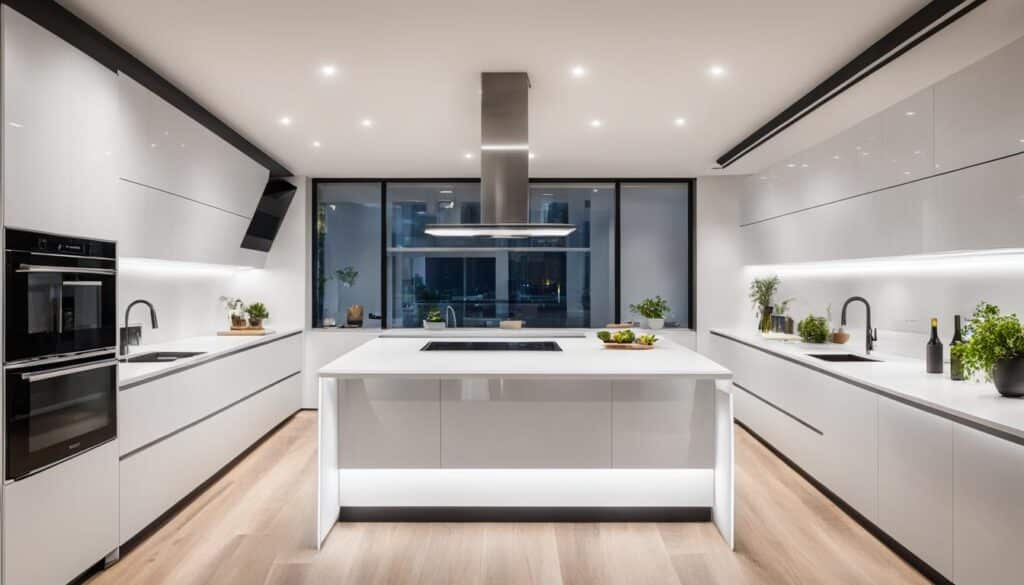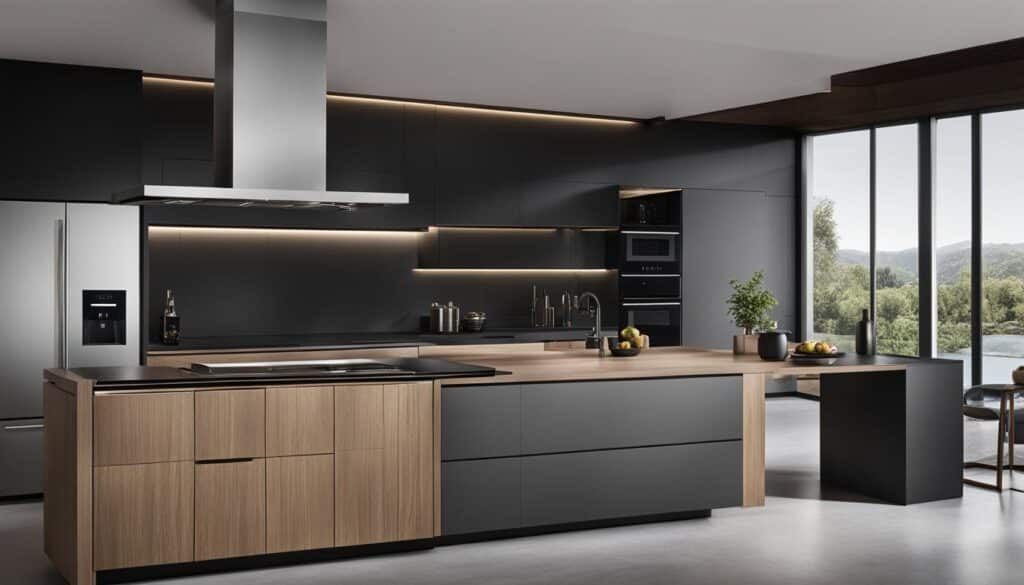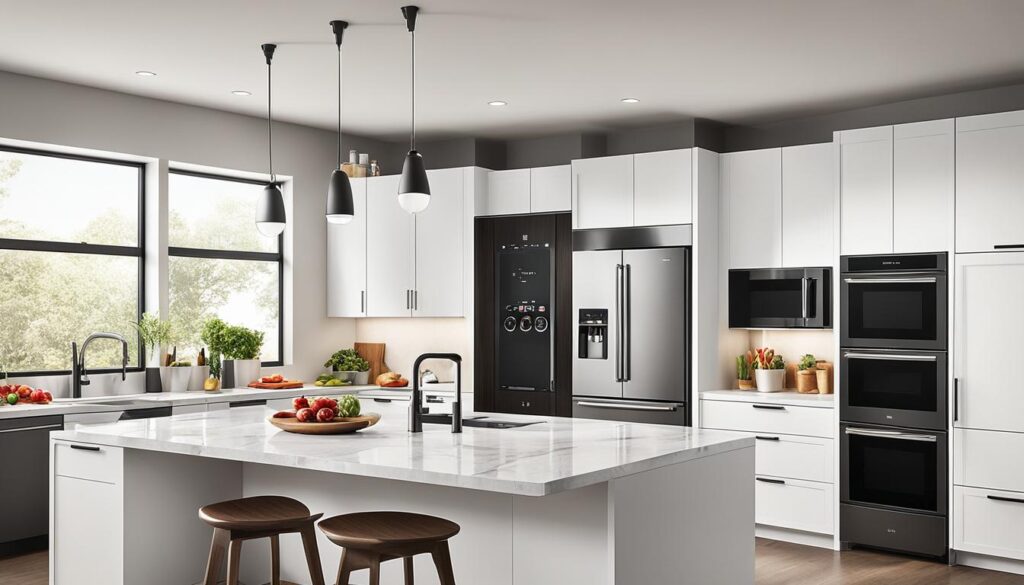Building a smart kitchen can be an exciting venture for beginners looking to transform their cooking space into a tech-savvy haven. With the right tips and tricks, you can enhance your kitchen’s functionality and efficiency. In this article, I will explore some valuable advice to help you get started on creating your smart kitchen.
Building a smart kitchen is more than just adding a few high-tech gadgets. It involves optimizing your space, integrating smart appliances and devices, and creating a connected and automated cooking environment. Whether you’re a tech enthusiast or simply aiming to simplify your daily cooking routine, these tips will help you navigate the world of smart kitchens with ease.
Table of Contents
Key Takeaways:
- Building a smart kitchen involves transforming your cooking space into a tech-savvy haven.
- Smart kitchens utilize technology to streamline cooking processes, improve energy efficiency, and enhance convenience.
- Essential smart kitchen appliances include smart refrigerators, voice-controlled devices, smart ovens, coffee makers, and dishwashers.
- Smart lighting systems and energy-efficient appliances are crucial for creating a smart kitchen.
- Integrating your smart kitchen into a larger smart home ecosystem allows for seamless control and automation.
The Benefits of a Smart Kitchen
Before diving into the tips, let me explain why having a smart kitchen can be so advantageous. A smart kitchen harnesses the power of technology to streamline cooking processes, improve energy efficiency, and enhance convenience. With a range of smart appliances, voice control devices, and automated systems, you can transform your kitchen into a truly intuitive and efficient space.
Let’s take a closer look at the key advantages of a smart kitchen:
“A smart kitchen utilizes technology to streamline cooking processes, improve energy efficiency, and enhance convenience.”
- Saves Time: With smart appliances and automated systems, you can optimize cooking tasks and reduce the time spent on meal preparation. From preheating your oven remotely to having your coffee ready when you wake up, smart technologies simplify your daily routine.
- Monitors Food: Smart kitchen technology allows you to monitor your food in real-time. With built-in cameras in smart refrigerators, you can check the contents and expiration dates from your smartphone while grocery shopping. Say goodbye to wasted food and unnecessary trips to the store.
- Enhances Efficiency: The integration of smart devices and appliances in your kitchen results in improved energy efficiency. By utilizing automation features and optimizing energy usage, you can reduce waste and lower your energy bills.
- Offers Convenience: Voice control devices, such as smart speakers and virtual assistants, enable you to control your smart kitchen appliances with simple voice commands. From adjusting oven temperature to playing your favorite recipe, convenience is at your fingertips.
Experience the Advantages
An image can provide a visual representation of the benefits of a smart kitchen. Take a look at the illustration below:
| Advantages of a Smart Kitchen | Traditional Kitchen |
|---|---|
| Saves time | Requires manual effort and time-consuming tasks |
| Monitors food | Relies on visual inspection and memory |
| Enhances efficiency | Can result in energy waste and higher bills |
| Offers convenience | Requires physical interaction with appliances |
As you can see from the comparison table, a smart kitchen offers a range of advantages that traditional kitchens lack. By embracing smart kitchen technology, you can enjoy time-saving features, reduce waste, and simplify your cooking experience.
Essential Smart Kitchen Appliances
To build a truly smart kitchen, there are a few must-have appliances that every tech-savvy home chef should consider investing in. These appliances not only make your cooking experience more convenient and efficient but also add a touch of modernity to your kitchen space.
One essential smart appliance for your kitchen is a smart refrigerator. These innovative appliances come equipped with built-in cameras that allow you to view the contents of your fridge remotely. Say goodbye to blindly rummaging through your fridge or wondering if you need to restock while you’re at the grocery store. With a quick glance at your smartphone, you can see exactly what’s inside and make informed purchasing decisions, thus preventing food wastage. Smart refrigerators also offer other features like temperature control and food organization systems, making them a game-changer for any kitchen.
Another must-have smart appliance is a voice-controlled device, such as a smart speaker or virtual assistant. These devices, like the popular Amazon Echo or Google Home, can be integrated into your smart kitchen setup to control various appliances and provide recipe assistance. With a simple voice command, you can turn on your coffee maker, preheat your smart oven, or even ask for step-by-step cooking instructions. Hands-free control and access to a wealth of information make these voice-controlled devices an invaluable addition to your kitchen.
In addition to smart refrigerators and voice-controlled devices, there are other handy smart appliances that can elevate your cooking experience. A smart oven allows you to remotely monitor and adjust cooking temperatures, ensuring perfectly cooked meals every time. Smart coffee makers can be programmed to have your coffee ready as soon as you wake up, while smart dishwashers offer features like energy efficiency and remote control.
When it comes to building a smart kitchen, the possibilities are endless. From smart refrigerators to voice-controlled devices and other innovative appliances, these additions can transform any kitchen into a high-tech hub. Embrace the convenience and efficiency that smart technology brings to your cooking routine, and enjoy the benefits of a truly smart kitchen.
| Appliance | Key Features |
|---|---|
| Smart Refrigerator | – Built-in cameras for remote viewing – Temperature control – Food organization systems |
| Voice-Controlled Device | – Hands-free control – Integration with other smart appliances – Recipe assistance |
| Smart Oven | – Remote monitoring and temperature adjustment |
| Smart Coffee Maker | – Programmable brewing – Energy efficiency |
| Smart Dishwasher | – Energy efficiency – Remote control |
Smart Kitchen Lighting and Energy Efficiency
When it comes to creating a smart kitchen, lighting plays a crucial role in both functionality and ambiance. By incorporating smart lighting systems, you can enhance convenience and efficiency in your cooking space.
Smart lighting systems are designed to be controlled remotely or through voice commands, allowing you to easily adjust the brightness, color, and even set automated lighting schedules. Whether you’re preparing a meal, entertaining guests, or simply enjoying a quiet evening, smart lighting can create the perfect atmosphere with just a tap or a voice command.

Benefits of Smart Lighting Systems
- Convenience: Control your kitchen lights from anywhere in your home or even when you’re away using your smartphone or voice commands.
- Energy Efficiency: Smart lighting systems use LED bulbs, which are energy-efficient and last longer than traditional incandescent bulbs. You can also optimize energy usage by scheduling lights to turn on and off automatically based on your daily routines.
- Mood Enhancement: Adjust the color and intensity of your kitchen lights to create the perfect ambience for different occasions. Whether you want bright, white light for cooking or a warm, cozy glow for a dinner party, smart lighting systems have got you covered.
- Security and Safety: Set up lighting automation to make your kitchen appear occupied even when you’re away, deterring potential burglars. Motion sensors can also provide additional safety by automatically turning on the lights when someone enters the kitchen.
In addition to smart lighting, energy efficiency is paramount in a smart kitchen. By choosing energy-efficient appliances, you can reduce your kitchen’s environmental impact and lower your energy bills while enjoying the latest technology.
Energy-Efficient Kitchen Appliances
| Appliance | Energy Efficiency Features |
|---|---|
| Refrigerators | Look for models with Energy Star certification, LED lighting, and smart features that optimize energy usage, such as vacation mode and door-open alerts. |
| Ovens and Stoves | Induction cooktops, which use electromagnetic fields to heat cookware directly, are more energy-efficient than traditional electric or gas cooktops. Look for ovens with convection options to reduce cooking time and energy consumption. |
| Dishwashers | Choose models with energy-saving modes, such as eco-friendly or quick-wash cycles, and sensors that detect load size and adjust water usage accordingly. |
| Lighting | Replace traditional incandescent bulbs with energy-efficient LED bulbs throughout your kitchen. Consider using dimmers or smart lighting systems to further optimize energy usage. |
To maximize energy efficiency, consider installing a smart thermostat in your kitchen. These devices can learn your temperature preferences and automatically adjust heating and cooling to reduce energy waste. Additionally, integrating automation features, such as occupancy sensors or timers, can ensure that lights and appliances are only activated when needed.
Incorporating smart lighting systems and choosing energy-efficient appliances are essential steps in creating a smart kitchen that not only enhances convenience and ambiance but also reduces your carbon footprint. Embrace the power of automation and energy efficiency to transform your kitchen into an eco-friendly and tech-savvy haven.
Integrating Smart Home Technology
A smart kitchen can be seamlessly integrated into a smart home ecosystem. By connecting your kitchen appliances and devices to a central hub, you can enjoy easy control and automation, enhancing the functionality and convenience of your kitchen.
Imagine being able to preheat your oven while you’re still at the grocery store, ensuring it’s ready to cook your favorite dish as soon as you step through the door. With smart home integration, this is entirely possible. By syncing different tasks and devices, you can streamline your kitchen routines and make them more efficient.
One of the key benefits of smart home integration is the ability to control your kitchen appliances and devices remotely. Whether it’s turning off lights and appliances when not in use or adjusting the settings of your smart refrigerator, home automation gives you the power to manage your kitchen from anywhere, at any time.
When choosing your smart devices, consider their compatibility and connectivity. Ensure that they can connect to your central hub or smart home system seamlessly. This allows for smoother communication between devices and enables you to have a cohesive smart home experience.
Take advantage of the connectivity options available and explore the possibilities of integrating your smart kitchen with other areas of your home. This interconnectedness brings a new level of convenience and efficiency to your daily life.
Benefits of Integrating Smart Home Technology:
- Convenient remote control of kitchen appliances and devices
- Streamlined kitchen routines and increased efficiency
- Enhanced connectivity and communication between devices
- Optimized energy usage and savings
- A cohesive smart home experience
| Smart Home Integration | Home Automation | Connectivity |
|---|---|---|
| Seamlessly integrate kitchen appliances and devices | Control and automate kitchen tasks | Sync devices for smooth communication |
| Convenience of remote control | Streamline kitchen routines | Ensure compatibility and connectivity |
| Efficient energy usage | Enjoy a cohesive smart home experience |

Conclusion
In conclusion, creating a smart kitchen can revolutionize your cooking experience and bring numerous benefits to your daily life. By following these tips for building a smart kitchen, you can transform your cooking space into a tech-savvy haven that enhances convenience, saves time, and promotes energy efficiency.
Investing in essential smart appliances is key to building a smart kitchen. Consider incorporating appliances such as smart refrigerators with built-in cameras, voice-controlled devices like smart speakers, and other useful gadgets like smart ovens, coffee makers, and dishwashers.
Optimizing lighting and energy usage is another important aspect to consider. Install smart lighting systems that offer remote control or voice commands for convenience. Additionally, focus on energy-efficient appliances, smart thermostats, and automated systems that optimize energy usage to minimize your carbon footprint.
To maximize the benefits of a smart kitchen, integrate it into a smart home ecosystem. Connect your kitchen appliances and devices to a central hub for seamless control and automation. This will allow you to synchronize tasks, such as preheating your oven while you’re still at the grocery store or remotely managing lights and appliances.
Embark on your journey to a smarter kitchen with these tips and transform your cooking space into a tech-savvy haven that simplifies your culinary adventures.
FAQ
What is a smart kitchen?
A smart kitchen utilizes technology to streamline cooking processes, improve energy efficiency, and enhance convenience through the use of smart appliances, voice control devices, and automated systems.
What are the benefits of having a smart kitchen?
Having a smart kitchen allows you to save time, monitor your food, and optimize your cooking experience. It also improves energy efficiency by using energy-efficient appliances and automated systems, and offers convenience by allowing remote control and automation of various tasks.
What are the essential smart kitchen appliances to consider?
Some essential smart kitchen appliances include smart refrigerators with built-in cameras, voice-controlled devices like smart speakers and virtual assistants, and other appliances such as smart ovens, coffee makers, and dishwashers.
How can I improve lighting in my smart kitchen?
Install smart lighting systems that can be controlled remotely or through voice commands for convenience and flexibility.
How can I make my smart kitchen more energy-efficient?
Choose energy-efficient appliances, install smart thermostats, and consider implementing automated systems that optimize energy usage, reducing your carbon footprint.
How can I integrate my smart kitchen into a smart home ecosystem?
Connect your kitchen appliances and devices to a central smart home hub for easy control and automation. This allows you to sync different tasks, such as preheating your oven while you’re at the grocery store, or turning off lights and appliances remotely when not in use.


